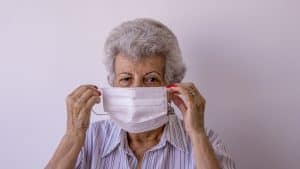
Masking up is still the best way to keep others healthy before you get the COVID-19 vaccine
Older adults over the age of 65 were one of the first groups to become eligible to receive the COVID-19 vaccine. If you have gotten your vaccine, or if you are finishing up your series, you might be wondering when it is safe to get back to a “normal”, pre-pandemic routine. The past year has been challenging for everyone and it is common to feel some trepidation as you head back to your church fellowship group, neighborhood book club, or even the grocery store. Here are a few ways you can ease back in safely.
After Your COVID-19 Vaccine
Once you have completed your COVID-19 vaccination series (or your one shot, depending on the type you received), it’s important to remember that you still need to do your part to reduce the spread of the virus to anyone who has not yet received a vaccine. Physicians and researchers are still learning about the novel coronavirus and most encourage the approach to be as cautious as possible.
- Remember that scientists say that it takes two weeks after your final vaccination shot to be fully protected from the virus. During those initial few weeks after your final shot, be sure you are taking similar precautions as you were prior to being vaccinated in order to stay safe.
- After you are fully protected, don’t throw away your masks. Even if your local or state officials do not have a mask mandate in place, it is still recommended that people use a mask when gathering in groups.
- It’s still safest to socialize or dine with others while outdoors. When possible, avoid crowded indoor settings.
- Social distancing is still recommended when in large groups or in situations when you will not be with just your immediate family or friends.
But there is good news after you have been fully vaccinated! As of this writing, the Centers for Disease Control and Prevention says that those who have been fully vaccinated can gather with other vaccinated people without wearing masks. You can also enjoy small gatherings with unvaccinated people as long as you stick with gathering with just one other household and as long as those unvaccinated people are not at a risk to develop significant complications due to COVID-19.
What does all of this mean? For many older adults, it means they can breathe a sigh of relief and feel safe to gather with their family without masks or other precautions.
The Emotional Impact of COVID-19

Small gatherings with family are the highlight of most post-COVID-19 vaccination plans
Once you are fully vaccinated, you are protected and might feel more confident getting out to the grocery store, bank, or your favorite diner. However, it is very common to still feel anxiety or depression after coming out of a year-long period of isolation. If you are worried about returning to a more normal routine, or if you aren’t sure how to pick up your social visits with friends, here are a few tips:
- Take it slowly. Don’t attempt to venture out for a day full of errands. That can feel overwhelming, especially if you aren’t used to wearing a mask for extended periods of time. Instead, start out by making time for one errand run per week or every few days.
- Bring along a companion. When you are ready to step out, consider bringing along a friend or family member for emotional support. Plan to meet your daughter for coffee on the patio of your favorite restaurant or go grocery shopping side-by-side with your grandson. It will help you feel more comfortable and it will make the outing more fun too.
- Talk about your fears with your physician. Isolation due to COVID-19 has taken a toll on the mental and physical health of older adults across the globe. Be sure you are keeping your physician in the loop with your worries and progress.
- Consider making a therapy appointment. Therapists are excellent support systems that can teach you coping skills that decrease feelings of anxiety. Ask your physician for a recommendation and make that initial appointment.
- Build your strength. If you have been mostly in your home for the past year, you might find that your strength and endurance are significantly less than this time last year. Work with your doctor to get the support you need, whether that is physical therapy outpatient visits, a mobility device, a structured exercise program, or a combination of more than one. You don’t want to run the risk of falling while you are outside of your home.
Stepping Back Into the Social Scene
Socialization is important to healthy aging, and now that you are fully vaccinated, you can start to get back to the groups you once enjoyed. While senior centers, park districts, and other agencies are taking things slow when it comes to group programming, you can still find safe offerings near you.
- You might have to make a reservation to attend events or groups. This can feel frustrating sometimes and make spontaneity a bit more difficult, but it is the only way agencies can keep groups limited and safe. Try making reservations for the whole week or month and writing your appointments on your calendar.
- Remember that your friends might still feel worried or cautious. Try to find ways to meetup with your pals in safe ways. Move your book club discussion to the driveway or catch up with friends while at the local park.
- Ease in slowly. Your conversation skills might need some practice and you might feel like there is so much to say to those you haven’t seen in such a long time. However, you might also feel more exhausted than usual after a long conversation. Take your time and schedule short visits first.
With your COVID-19 vaccine helping your body be more protected against the coronavirus, you are one step closer to pre-pandemic life. Take it nice and slow; most importantly, enjoy the errands and connections that we all once took for granted.


